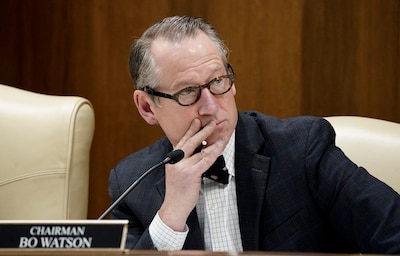Sign up for Chalkbeat Tennessee’s free daily newsletter to keep up with statewide education policy and Memphis-Shelby County Schools.
After a decade of painful takeovers of neighborhood schools, contentious handoffs to charter networks, and mostly abysmal student performance, Tennessee’s Achievement School District appears to be on its way out.
Several of the GOP-controlled legislature’s top Republicans are acknowledging that the state’s most ambitious and aggressive school turnaround model has failed — and should be replaced eventually with a more effective approach.
Meanwhile, Democrats continue to push for legislation designed to end the so-called ASD, created under a 2010 state law aimed, in part, at transforming low-performing schools.
“I expect we will move in a different direction,” Sen. Bo Watson, the powerful chairman of his chamber’s finance committee, recently told reporters.

The Hixson Republican called the charter-centric school turnaround model an “innovative” idea that fell flat, at least in Tennessee. It would be foolish, Watson added, to keep spending money on an initiative that isn’t working and already has cost the state more than $1 billion — a sentiment echoed by Lt. Gov. Randy McNally and House Speaker Cameron Sexton.
But if the legislature decides to shutter the ASD and Gov. Bill Lee signs off, important questions remain about how Tennessee will support thousands of students in its lowest-performing schools.
- How quickly will the shutdown occur?
- What will happen to ASD school communities? Currently, the district serves 4,600 students in 12 schools in Memphis and one in Nashville.
- Will the state honor remaining contracts with charter operators, the last of which end in 2026?
- What statewide improvement strategy will replace the ASD for schools in the state’s bottom 5%? Ninety-five schools currently fall in that category and many have undergone a variety of interventions, with limited success.
- And will the U.S. Department of Education approve the change as part of Tennessee’s plan for complying with the 2015 U.S. law known as the Every Student Succeeds Act, or ESSA?
In order to receive hundreds of millions of dollars in federal education funding to support Tennessee students and schools, the state is required to have a rigorous improvement plan for schools that are struggling the most. Since Tennessee’s ESSA plan was approved in 2017, the ASD has served that purpose.
The turnaround district “serves as our most intensive intervention for priority schools,” declares the 401-page plan, the state’s guiding document for K-12 accountability policies. It also commits Tennessee to making school turnaround a priority.
“Students can’t wait,” the plan says. “Schools that have been historically underperforming and are not showing adequate growth must have state intervention.”
Brian Blackley, a spokesperson for the state education department, said scrapping the ASD would require two things: a change in state law and an amendment to Tennessee’s ESSA plan.
If the legislature changes the law, ESSA revisions are doable, according to a spokesperson for the U.S. Department of Education.
“Tennessee has the ability to make changes to the design and structure of its local educational agencies, including the Achievement School District, without first seeking approval from the U.S. Department of Education,” the spokesperson told Chalkbeat.
That said, because the ASD is central to Tennessee’s federal accountability plan, the state would have to submit an amendment to the federal government, and “the department will work with the state as needed,” the spokesperson said.
The process likely would take months, since a period of public engagement on potential changes is required.
ASD brought high hopes, hard lessons
While the ASD’s demise has been looming, its birth was filled with hope when Tennessee passed the First to the Top Act, a sweeping education reform package that was the cornerstone of its winning federal Race to the Top grant application.
Taking cues from the successful turnaround of schools in New Orleans and using tens of millions of federal dollars to pay for the rollout, Tennessee’s new law created a state-run district with the power to take over struggling schools and recruit charter management organizations to run them, giving those operators autonomy to design and implement plans for curriculum, instruction, and school leadership. KIPP and Green Dot Public Schools were among national networks that signed on, and the model inspired several local charter groups to form and join the work.
Unlike incremental academic gains associated with school improvement, school turnaround calls for dramatic gains in a short period of time. Founding ASD leaders set an extraordinarily ambitious goal: to move those schools from the bottom 5% to the top 25% of performers within five years.
But the large academic gains never came.
Removing schools from local governance didn’t improve student outcomes. In fact, most ASD schools performed no better than low-performing schools receiving no intervention, according to researchers.
High teacher turnover was a constant challenge, and it became increasingly hard to recruit high-quality charter networks to do school turnaround work.
Community backlash was also significant, especially in Memphis, which became the hub of the ASD’s work and has a long history of charged racial dynamics. ASD critics viewed the takeover of neighborhood schools — and introduction of charter operators who often came from out of state — as another example of racism and reckless social engineering.
The level of poverty in Memphis was another major challenge.
“I think that the depth of the generational poverty and what our kids bring into school every day makes it even harder than we initially expected,” founding superintendent Chris Barbic told Chalkbeat in a 2015 interview. “We underestimated that.”

The ASD has been shrinking for awhile
The state-run district had a peak of 33 schools after taking control of its last four campuses in Memphis in 2016.
While there’s been no official decision on its future from lawmakers or new recommendations from Lee’s administration, the ASD has been unwinding on its own, especially since 2022, as schools began to complete 10 years under the model.
Originally, the state promised to return ASD schools to their home districts in better shape than when they left. But that policy changed over time, and now there are multiple ways to exit, and even remain a charter school, depending on academic performance.
Some non-charter ASD schools began returning to Memphis-Shelby County Schools, while three charter schools pivoted to the oversight of the Tennessee Public Charter School Commission, another state-run entity, after showing enough improvement to exit on their own. The Memphis district also regained control of a charter school and placed the campus in its own turnaround program known as the Innovation Zone, an initiative created in part to keep the ASD from taking over more schools.
As for remaining ASD campuses, the charter contracts for operators of seven schools are scheduled to expire this summer; two schools after the 2024-25 school year; and four schools at the conclusion of the 2025-26 school year.
But the pandemic complicated an already complex exit process by disrupting state testing. ASD leadership also turned over frequently and downsized staff in the summer of 2022. The chaotic unwinding has put thousands of students, families, and school staff in limbo.
Of the contracts expiring this year, for instance, only two charter schools are set to continue operating in Memphis. Journey Coleman will stay with Journey Community Schools through a new agreement with the Memphis district, while Cornerstone Lester Prep will continue to be run by Capstone Education Group through the state-run charter school commission.
Memphis-Shelby County Schools plans to close MLK College Prep High School, currently run by Frayser Community Schools, and those students are still deciding where they’ll attend school in the fall.
Fairley High School, which lost its bid to remain with Green Dot Public Schools, is expected to return to MSCS oversight. Green Dot has other schools still in the ASD, and the network’s executive director in Tennessee, Jocquell Rodgers, expects their charter contracts will be honored.
“Has it been emotional? Absolutely,” Rodgers said of the lengthy unraveling.
School turnaround work is a difficult and time-intensive process that requires constant engagement with families and the community, Rodgers said. Ideally, there should be collaboration with the local district, she added.
“It is extremely important to bring something to people that they really want, but at the same time, really help them understand what they need,” Rodgers said.
If not the ASD, then what?
Tennessee has doggedly stuck with the ASD, even as its performance has been mostly lackluster.
But January’s abrupt departure of Bren Elliott, Tennessee’s first statewide turnaround superintendent who was hired last August after a three-year search, cast doubts about the future of the state’s school improvement work, especially regarding its most intense intervention tool.
And GOP leaders such as Sexton, the speaker of the House, fueled speculation by hinting that a mechanism for closing the ASD could be part of upcoming legislation for creating a new statewide school voucher program.
There’s little consensus, however, on a replacement strategy for supporting struggling school communities — a requirement under federal ESSA law.
RELATED: School turnaround lessons from Memphis zero in on the need for collaboration at all levels
Rep. Antonio Parkinson and Sen. Raumesh Akbari, both Memphis Democrats, have proposed legislation to prevent the state-run district from taking over more low-performing schools. Instead, the ASD would become a resource hub for school improvement work across Tennessee.

But the measure, which has cleared two key House committees, may not meet ESSA’s standard for a comprehensive school turnaround strategy. Akbari said this week that she’s working on changes before introducing their proposal in Senate committees.
Sen. Ferrell Haile, a Republican from Gallatin, has pointed to Tennessee’s small school turnaround pilot project, approved by the legislature in 2021, as one possibility. Two private vendors, Georgia-based Cognia and Ed Direction of Salt Lake City, Utah, are working with two schools in Memphis, two in Nashville, and one in Chattanooga, as part of the five-year initiative.
But it’s uncertain whether that program can scale statewide. And while four of the schools have shown promise, Hamilton County lawmakers say it hasn’t gone well in Chattanooga. They are shepherding a bill to pull Orchard Knob Middle School before the pilot ends in 2025.
Tennessee Education Commissioner Lizzette Reynolds, who has the authority to take over more schools and place them in the ASD under current law, has not commented publicly about the district’s future, or a potential new strategy.
If the legislature lets the state-run district run its course through the 2025-26 school year, when charter contracts expire for its last four schools, her department would have more time to develop a plan. The agency would then work with the U.S. Education Department to revise Tennessee’s ESSA plan accordingly.
One important step, according to federal ESSA guidance, is to give the public opportunity to comment on the proposed revision. And educators who are doing turnaround work hope state leaders will take their observations to heart.
Bob Nardo was an early ASD staff member who left to operate Libertas School of Memphis, one of the state-run district’s few success stories.
Just because the ASD didn’t work, he said, doesn’t mean the state should walk away from trying to address persistent challenges that led to its creation. Nardo believes one question should be central to discussions when developing a new plan.
“Are the most vulnerable and at-risk children in our society getting the best opportunity to transform their lives?”
Nardo worries the state could shift to piecemeal interventions, such as grant programs aimed at small-scale improvements, that wouldn’t be as effective as a comprehensive, schoolwide turnaround strategy.
“We have to confront the paradox here that this is both a critically needed and indispensable type of work,” Nardo said, “with the sobering reality that most efforts have not been successful” in Tennessee and across the country.
Marta Aldrich is a senior correspondent and covers the statehouse for Chalkbeat Tennessee. Contact her at maldrich@chalkbeat.org.
Laura Testino covers Memphis-Shelby County Schools for Chalkbeat Tennessee. Reach her at ltestino@chalkbeat.org.


